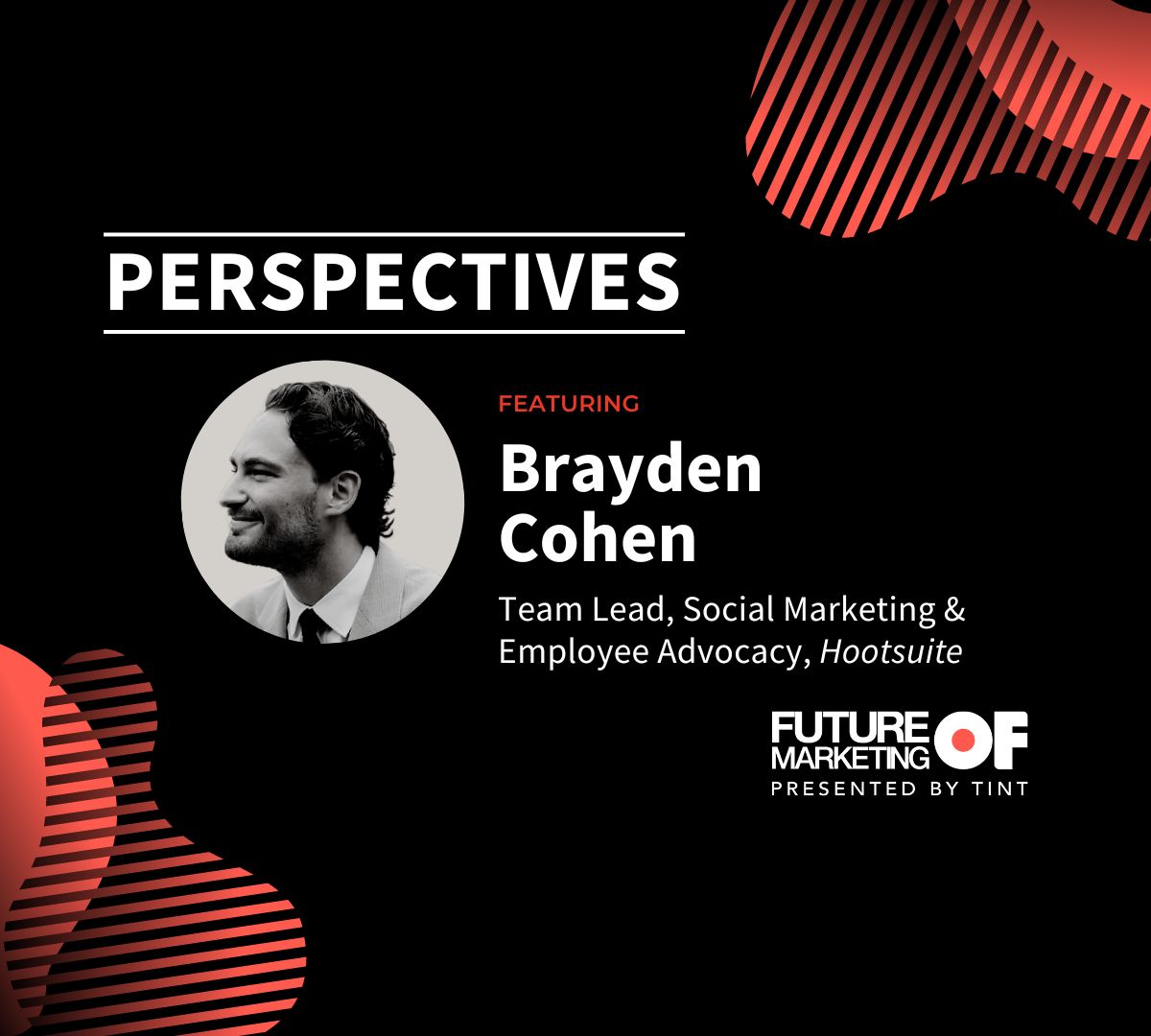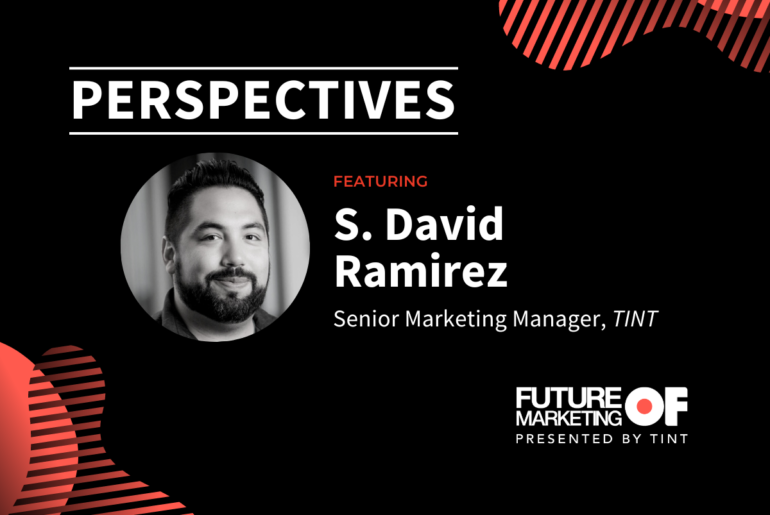Brayden Cohen leads Social Media and Employee Advocacy for Hootsuite.
In his words, he shares:
- Why social media marketers need a seat at the table
- The value of customer and employee advocacy
- Why not everything needs to be measured or bring ROI
What in the world does your day-to-day look like?
It’s so hard for me to articulate exactly what I do because the world of social and marketing are so vast and there are so many different areas that we’ll be focusing on.
I’m pretty lucky [to be working at Hootsuite] because we have a robust social marketing team. We have people that oversee regional channels and global channels – but for me specifically, my day-to-day varies quite a bit, depending on what’s happening in the world. There are always different trends and content; you have to stay agile and on top of things.
But my day-to-day, specifically in my role, a lot of what I do is focus on project management and campaign management. At Hootsuite, we have a ton of different marketing campaigns that are always in market. I’m always overseeing how those are working on social and making sure that the rest of the team is staying up to date on launch plans and publishing plans. That takes into account a lot of people-management within our team to make sure everyone’s staying on top of the different campaigns and tactics.
I also oversee TikTok, Facebook, and Instagram strategies for our dynamic social channels; those are three huge channels for us. There are hundreds of thousands of followers that are part of our social channels for just those three. That looks like copywriting, content creation, strategy, content production, storyboarding, paid social, and boosting.
And of course, with that, a lot of reporting, tracking, keeping on top of insights – What are our competitors up to? What’s happening in the industry?
And when it comes to employee advocacy, I oversee our internal use case for a product here at Hootsuite called Hootsuite Amplify; I oversee how our employee advocacy runs day-to-day, but also at a high level as the program manager.
People typically depend on one marketer for design, writing, web management, etc.– but when you look at bigger companies, like Hootsuite, you see that a lot of these are actually very specialized. And each of these roles requires a lot of work that goes into it.
100%. With social marketers, specifically, you have to wear so many different hats because your area of focus is so vast.
A copywriter writes copy, a content creator creates content, a designer designs content – but being part of social, you need to do a bit of it all because it kind of touches all areas of a social profile or a brand or a campaign. And I think that’s why, here at Hootsuite, I feel grateful that our team is big enough to take on these tasks. I mean, no team is ever big enough.
Where do you tend to get all of your news and insights from? Are there any blogs or podcasts or newsletters that you like?
I honestly get most my updates and news from the social channels themselves… my For You page on TikTok, my Explore feed on Instagram, my Newsfeed on LinkedIn, and many people I follow. So many of the people the algorithm feeds me actually really help me within my day-to-day role because I’m finding, reading, and consuming updates around marketing news, tech news, and social media updates.
That’s probably the first place I go to stay up-to-date, but then I go to other places for industry news – Social Media Today, which is great; not shamelessly plugging them, but the Hootsuite blog does an amazing job at helping me and other marketers stay up-to-date around these types of things; there is, of course, the Future of Marketing newsletter as well. And the podcast.
And others I’m subscribed to – Morning Brew, Hustle, Stack Marketer. They’re all kind of similar but different at the same time. I like having them in my inbox every morning for me to creep through as I have my morning cup of Joe.
I’m going to throw a little plot twist in here. What is on your TikTok algorithm?
It’s a mix of everything. Sometimes I’m so overwhelmed because [the algorithm] knows me so well. But it includes a lot of what’s happening in the world today, around social media and tech.
What is this brand doing? Different PR stunts, men’s fashion, travel, blogging, dog, alcohol.
What is something interesting or surprising you’ve learned in the last couple of months?
With my role starting to focus more and more on TikTok, it’s been a platform that I spend more time on for research, but also obviously to stay on top of trends and our strategy.
We recently had our Q2 update of our Digital 2022 report launched here at Hootsuite. And there’s so much amazing data and insights in there. And one data point that I learned, which I found really interesting was that 33.9% of TikTok users don’t post to the platform. They’re just on the platform, including me. They’re just consuming – we’re lurkers.
And with TikTok and exploring it more, one area that I’ve spent a lot more time in is kind of their ads platform to see what the capabilities are. I’m learning that side of paid social when it comes to TikTok and spark ads, and when to spark a piece of content that’s performing well.
To compare the data point, I think this might be a bit off, but I believe around 69% of Instagram users are posting and creating content. It’s about a 60% difference between Instagram and TikTok, so it’s pretty large. I definitely spend more of my time consuming the content, especially within my role. Of course, in terms of creating it, I do that on behalf of the brand, not for me personally, but I think that’s why there’s such a big opportunity for content creators – because they’re so good at what they do. The content production, storyboarding and actually executing and “videoing” yourself.
It’s a lot of work and physical and mental energy to be posting a TikTok every single day, every other day, or maybe more than once a day. I think that’s why a lot of people, instead, consume.
Creating content is easier said than done. Especially with TikTok; it’s hard enough to master taking the perfect photo on Instagram. Now you’re adding video to that – and people are so creative.
100% – and with TikTok, it can be quite low-fi content. Like it doesn’t need to be overly produced. It shouldn’t really be overly produced, but still low produced content doesn’t make it that much easier cause you’d need an idea. You need something sticky, entertaining, or factual to catch your audience’s attention and provide value to them.
On that topic, what’s something that you feel marketers should stop doing on social media?
I feel like marketers need to stop doing everything. I need to practice what I preach because I see something new and shiny and I’m like, “We should do that!”
But really, I think marketers need to focus on what they can do well and what they know works, but also, of course, test new things – but it doesn’t need to be everything. There are certain trends and things happening in the industry – certain algorithmic changes that, for your brand or industry, might just not make sense. And that’s okay.
It’s just remembering to stick to what works and test what you want to see work – but it doesn’t need to be it all. It will also help prevent burnout in the long run.
What is something that you’d like to see marketers do more?
We need a seat at the table. Social marketers, specifically, hold so much knowledge when it comes to our customers, our business, and what prospects want and are looking for. And we have so much data on what’s happening online.
I think [usually] that information is shared in silos or maybe just into our team if we’re not opening up another seat at the table for social marketing teams or members to share those insights. And for an organization, that data and those things we are reading and seeing online from our customers or our competitors can really help a business grow, stay competitive, or see areas of opportunity.
That’s something that businesses as a whole should start doing that will help enable marketers within their roles to feel seen. And part of something.
One of my colleagues told me one of the recommendations for the Travis Scott concert was that there should be someone on social media staffed during the event so that you can listen to the sentiment in real-time because then you can take this information and move it up the chain of command.
I love that example. I love it because social isn’t just social anymore. We support so many other areas of a business… for example, events. If a social member is listening and engaging during an event, it can help with crisis communications.
It can help engage throughout. So, understanding during and post sentiment of a specific event on social will help you understand what people are saying.
You mentioned how the content on [TikTok] doesn’t have to be overly produced. Why do you think user-generated content and even employee-generated content are so valuable for brands?
There are so many different reasons. I want to preface it to say that in the past couple of years, I’ve seen so much more dialogue about employee-generated and user-generated content on social, in webinars, on LinkedIn specifically.
I’m so happy to see that because businesses (small and large) are now understanding the value it can bring. You work at TINT, where UGC is so integrated into everything that your organization is doing, and the same here at Hootsuite with employee-generated content.
So I think first and foremost, what I love about employee-generated content is it positions the employee as the authority and the thought leader and not the brand. And I think employees need that opportunity to position themselves as thought leaders and build their own personal brand online. So I think that’s incredibly important – for selfish reasons, as an employee, obviously.
And then, UGC helped us build awareness and credibility for our organization. People trust a company stakeholder, like an employee, way more than they trust a brand. There’s tons of different research from Edelman Trust Barometer and Hootsuite.
And it provides you and your organization with more streams for reach as well. Which you wouldn’t have anywhere else because how else would you tap into the networks of your employees? That’s why I think it’s so valuable for brands at a high level.
What is something that you feel most marketers tend to struggle with and what are some solutions to this?
Using personal experiences, and experiences of other colleagues I know, I would say it depends where you work and each situation, but I think it’s the room to be creative and really have that test and learn and iterate approach.
That’s one thing that I think is a really big struggle for a lot of marketing teams, because a lot of the time, bandwidth is so limited and you are kind of focusing on your always-on content or things that work. So you don’t have the opportunity to test new things. And I think marketing is really all about both sides of the brain, analytical and strategic, but also being creative – getting your hands dirty and testing new areas.
As a marketer, that’s something that I’ve struggled with before too. And how can we fix this?
I think it’s finding more time to look at these things and freeing up time and getting more resources. And I think maybe that’s part of having more visibility on marketing or social marketing teams to provide them with more freed-up time to focus on getting creative.
Something that you said before this call is that your efforts don’t always have to bring ROI – or you don’t always have to measure it. What do you mean by that?
Going to business school, which I’m sure you can relate to, either goes back to the dollars – how are you helping impact the business, the bottom line, things like that. That’s incredibly important, of course, because it helps you in the long run, but not everything is going to have a key metric tied to it. Sometimes things go viral and it really helps your brand. And that, maybe, was hard to measure. You didn’t know it was going to go viral before.
It’s incredibly important to still move forward with certain tasks or initiatives that are creative, but it might not be tied to a KPI. And that’s what allows people to think outside of the box.
When you don’t need to tie things to generating leads instead go have fun because you have a creative idea, post about it on social, send an email about it, create a podcast about it, and see what happens. And then from there, if you see that something is working, that’s when you can build out a plan around it.
Design is an example of this. You can’t really measure design and yet, it reels people in.
I think that’s the thing about TikTok right now. Right? So many brands are still using it and it’s mainly a brand awareness play, especially if you’re a B2B brand. And that’s hard to measure a lot of the time – besides, more vanity-type metrics and video views or engagements – which are incredibly important, but there might not be ROI with that. There are tons of different examples of brands that have developed a huge cult following from TikTok, and brand awareness, and the same as Instagram in the early days too.
What do you feel that the future of marketing looks like?
More focus on one-to-one relationships when it comes to marketing when it comes to community building. I think a lot of the time people are hopping on social channels to have an authentic and unique experience. And I think that kind of now moves really close into the creator economy.
People really want to [connect]; they want like “a day in the life” and to really understand what’s happening with an influencer; they want to be behind-the-scenes with a brand, what’s happened in the day in the life of an influencer outside of just on their channels.
So I think there’s a lot of opportunity for one-to-one relationships, community building, and authenticity. A lot of the big social networks are also focusing a lot on social commerce – what that will look like on their networks and how that ties into the creator economy, tokens, and supporting your favorite influencers.
There are so many different avenues that marketing can go towards right now, which is why I feel like I’m very excited to be here specifically.
I can’t wait until the creators have more power.
I think that’s what I’m expecting. It’s going to be interesting to see the path that a lot of creators versus businesses take on these big networks because a lot of the investments in the past couple of months even have been mainly focused on creators, like on Instagram on TikTok.
It’s going to be interesting how businesses can leverage those changes on the networks, but also how they partner with the creators to leverage those new solutions like being introduced by Instagram and TikTok, etc.
What is a book, podcast, person, or event that shaped your career, and why?
I love that question because there’s no one specific thing that’s happened in my career that has brought me to where I am today.
It’s honestly been an accumulation over time of my managers. I’ve had amazing mentors over the past several years that have helped me, that have supported me, and that have been there to coach me. But not only managers – having family and friends that have listened to me complain and been there for vent sessions, been part of my support group, and professors being part of my undergrad.
And I’m sure you maybe felt the same way; I know a lot of people do – you don’t really know what you want to do. You’re kind of like, in that time, in a gray area… like I’m in my undergrad and I don’t know why I’m here. I took an intro to marketing course and I was like, “I’m going to take this as an elective.”
And I will say that one professor I had was game-changing for me because I took that elective, not knowing if I’d like marketing, and he was amazing. It was like the four Ps – the very basics of marketing – and he made it interesting. He had so much industry expertise and knowledge that helped bring real-life examples into that course. And that’s what really when I had that light bulb moment and I said, I can see myself doing this.
So maybe it was that one moment that really helped me, but then along the way, it was an accumulation of all those things – even attending panel discussions and listening to insights from people, being in meetings with groups of people here in Hootsuite and listening to their perspectives… and their ideas even helped shape my career because it’s a new perspective and understanding for me as a marketer.
It’s interesting how you can look back and see almost all of these little decisions that shaped who you are now. You don’t think about it when you’re going through this journey – but looking back, it’s almost as if everything was intentionally placed for you to say yes or no to. And I definitely agree with you on having a good manager.
You need that one bad manager to know what a good manager looks like, or work at one bad company to know what a good company looks like. Those good and bad experiences are equally as important in my eyes.
They’re lessons – and you learn from them and you get better. Where do you tend to look for your inspiration?
I’m inspired by people, places, and things. I’m pretty sure that’s like the definition of a noun as well if I’m not mistaken.
I love traveling because that’s where I got really inspired, seeing different cultures, and perspectives of living. I think it brings a lot of diverse experiences into the workplace and also keeps me going and fueled. But other areas I find inspiration – being outside.
I live in Vancouver, Canada. I’m right in between forest, ocean, and mountains. And each of them is between 10 minutes to an hour away. Stress-free, hopefully, no phone, no computer, and able to just fully immerse with outdoors really helps me get inspired, but also looking at different areas of kind of culture.
Fashion, music, what’s happening, and different trends also get me really inspired because it allows me to connect to different areas and how it could enhance my content plan, my strategy, or just the way that I think about certain things as well.
What advice do you have for marketers and creatives who look up to you?
If you look up to me, thanks. I appreciate that. First, I would say… always keep learning and asking questions.
I know sometimes that’s anxiety asking questions; you might feel like it’s a dumb question, but there are no dumb questions. It will uncover a lot of different things for yourself, but also maybe for other people that might have not thought of that question or were too hesitant to ask it.
I think another thing that sparks anxiety in a lot of people, including myself is that it’s okay to not know everything; I’m still figuring stuff out every single day, whether it’s like personal life, professional life, career, whatever it is – it’s okay to understand that everything will work out.
As you said before, everything really does happen for a reason. All those little moments add up and will bring you to a certain place at some point. So just know that. And then I think just finding a support system – other professionals in your network, your family, friends. Heck, it could be your dog.
To your second point, I am 30 years old and I still don’t know what I’m doing. I’m still figuring it out. So to this, let this be your peace of mind.
Exactly. There’s always going to be that uncomfortable feeling – just get comfortable with being uncomfortable in those scenarios. That feeling – the serotonin level after it’s unbeatable.
How do you wind down from a long day of work?
Computer shut, phone flipped sometimes.
I go for a walk, work out. I have my Peloton right here – a little COVID investment and it really helped me out with mental and physical health. So that’s probably one of the first things I would jump onto. And then I would say, seeing family or friends, relaxing by the TV, having a drink, all the normal stuff, that’s what I would do to wind down.
Sometimes, I wind down by cleaning.
Final question. What are you excited about or looking forward to?
I’m very much a planner, so I like to always have things to look forward to because helps me in a day that I’m going to be in a rut or maybe not feeling inspired.
I have a few trips planned coming up, so looking forward to those. I’m going to Whistler, hopefully, which is like a mountain area very close by – and just going to just relax there. And then, hopefully, going to Europe in the summer, which fingers crossed, I’m looking forward to.
We also have a ton of exciting things happening here at Hootsuite, which I cannot speak about just yet. So, stay tuned for the future – but I’m excited about all of that too because it makes my day-to-day exciting just knowing that there are fun things in the works.
Want to learn from other marketing leaders like Brayden? Subscribe to Future of Marketing for updates and strategies.





